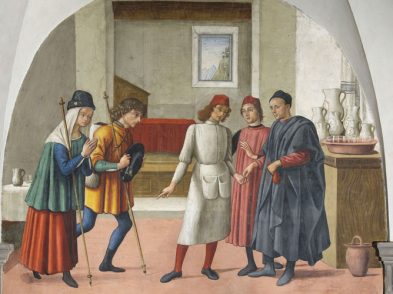Feigning madness in Milos Foreman’s One Flew Over the Cuckoo’s Nest won Jack Nicholson an Academy Award for Best Actor in 1976. Based on a novel of the same name written in 1962 by Ken Kesey, who had worked as an aide on the night shift at the Menlo Park Veterans’ Hospital in California, the film was shot at the Oregon State Hospital in Salem, an actual mental hospital. The picture, an allegory of the rebellion of the anti-hero, Randy McMurphy, Nicholson’s character, against oppressive institutional authority personified by Nurse Ratched, played by Louise Fletcher, who also won an Oscar as Best Actress for her portrayal of this despotic sadist, resulted in reforms being made in mental health public policy in the United States.
In Europe, these reforms came about during the same period, thanks to the antipsychiatry movement, which was part of the growing worldwide counterculture of the 60s and 70s that balked against all forms of political, social, sexual and racial injustice. The main champions of the antipsychiatry movement were Thomas Szasz in America, Ronald Laing and David Cooper in England, Michel Foucault and Félix Guattari in France and Franco Basaglia in Italy. These men believed that, whereas traditional psychiatry tried to ‘normalise’ those with mental illness through institutionalisation and treatments such as high doses of psychotropic drugs, electric shock and other coercive practices like lobotomy, personal reality and freedom did not, in fact, depend on any definition of ‘normalcy’ that organized psychiatry attempted to impose. Instead, the objective of antipsychiatry was to protect the rights of the mentally ill, to leave them free to express themselves and to reinsert them into society. Mental asylums, therefore, needed to be abolished.
In Italy, this objective was achieved by the psychiatrist Franco Basaglia who, almost single-handedly, spearheaded a decade-long campaign which resulted in the enactment of Law No. 180 on May 13, 1978. Commonly known as the Basaglia Law, its purpose was to ban all asylums and compulsory admissions into institutions and replace them with small community hospital psychiatric units and day centres.
Born in Venice on 11 March, 1924, Basaglia studied medicine and psychiatry. In 1961, he became director of the psychiatric hospital in Gorizia, where he was appalled by the prison-like, repressive conditions in which the inmates lived, commenting that a patient entered as a ‘person’ only to become a ‘thing’ in the asylum. During his tenure, he totally transformed the lives of the 650 patients in residence there. He allowed them freedom of movement withinin the institution and its park, abolished electroshock and established a ‘therapeutic community’ among patients, psychiatrists and staff. In 1969, he left Gorizia and spent two years at the mental hospital in Parma before being appointed, in 1971, director of the San Giovanni Asylum in Trieste.
To stimulate its 1,200 internees, he set up painting and theatre laboratories and a patients’ cooperative so inmates could begin to work and be paid. This experience reinforced his conviction that asylums should be closed and replaced by a network of community services to assist the mentally ill instead of segregating and dehumanising them.
Thanks to his work, in 1973, the World Health Organisation nominated Trieste a ‘pilot zone’ for mental health services. The same year, Basaglia founded, with the support of the political Left, the Democratic Psychiatric Movement, which still exists today. Through a series of protest marches and demonstrations, the Movement had the asylum in Trieste closed in 1977. The following year, the Basaglia Law was passed but not without considerable trepidation of some members of the community, who feared violence at the hands of the demented they thought would now be let loose on the streets.
1n 1979, after returning from a lecture tour in Brazil, Basaglia moved to Rome, where he became coordinator of psychiatric services for the Lazio Region until his death of a brain tumour on August 29, 1980. With his wife, fellow psychiatrist Franca Ongaro (1928–2005), who co-authored several of his works, he had two children.
Over the last 30 years there have been 29 unsuccessful attempts to reform the Basaglia Law, although few people want to see the rights, liberties and possibilities of those suffering from mental disorders diminished. However, achieving the reality of prevention, cure and rehabilitation of mental illness through a strong, well-funded and comprehensive system of regional mental health services throughout Italy is still somewhat a utopian dream.
Not infrequently, families are left to cope alone, sometimes needing to hospitalise their seriously disturbed relatives in expensive private clinics. Other unfortunates without families swell the ranks of the homeless.
Credit: original drawing by Leo Cardini, based on this photograph on Wikipedia and released under same creative commons license








